A slice of rustic farm life in rural Goa.
◊ By Rutaksha Rawat. Photos © Pure & Eco India
Visit ORGANIC SHOP by Pure & Eco India
On a recent trip to Goa, I had the pleasure of spending a night at Dudhsagar Plantation, a verdant organic farmstay spanning 50 acres with more than 150 species of plants and trees.
Located near the Dudhsagar Falls, this tropical paradise is home to only 5 eco-friendly cottages, each, shrouded in a veil of foliage.
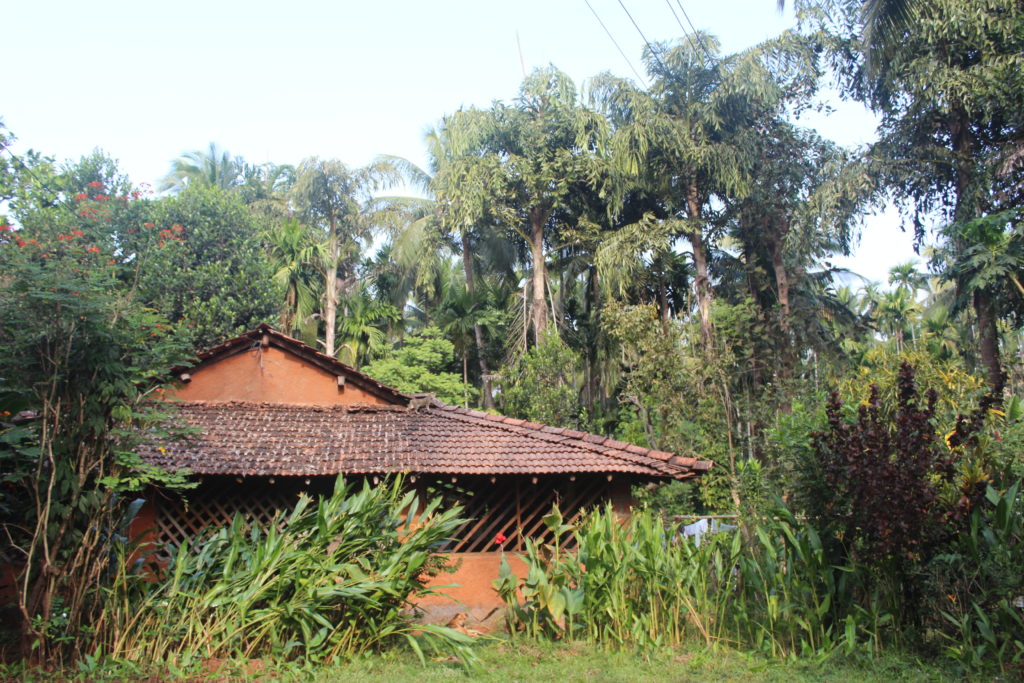
Dudhsagar Plantation spans 50 acres and nurtures more than 150 species of plants and trees.
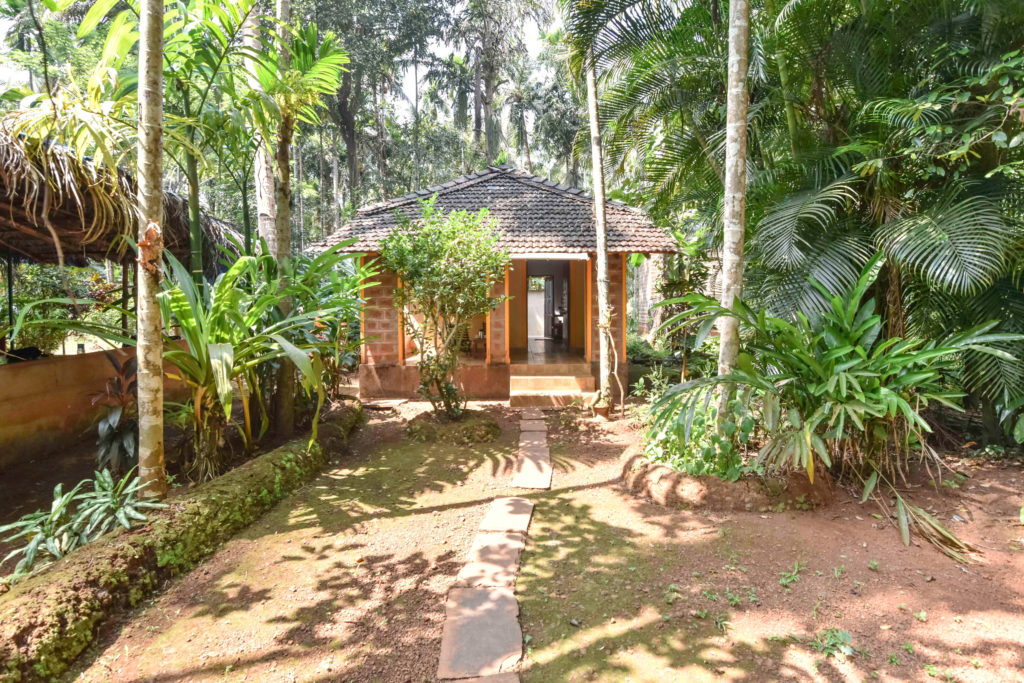
The tropical paradise is home to 5 eco-friendly cottages, each shrouded in a veil of foliage. Photo source: www.dudhsagarplantation.com
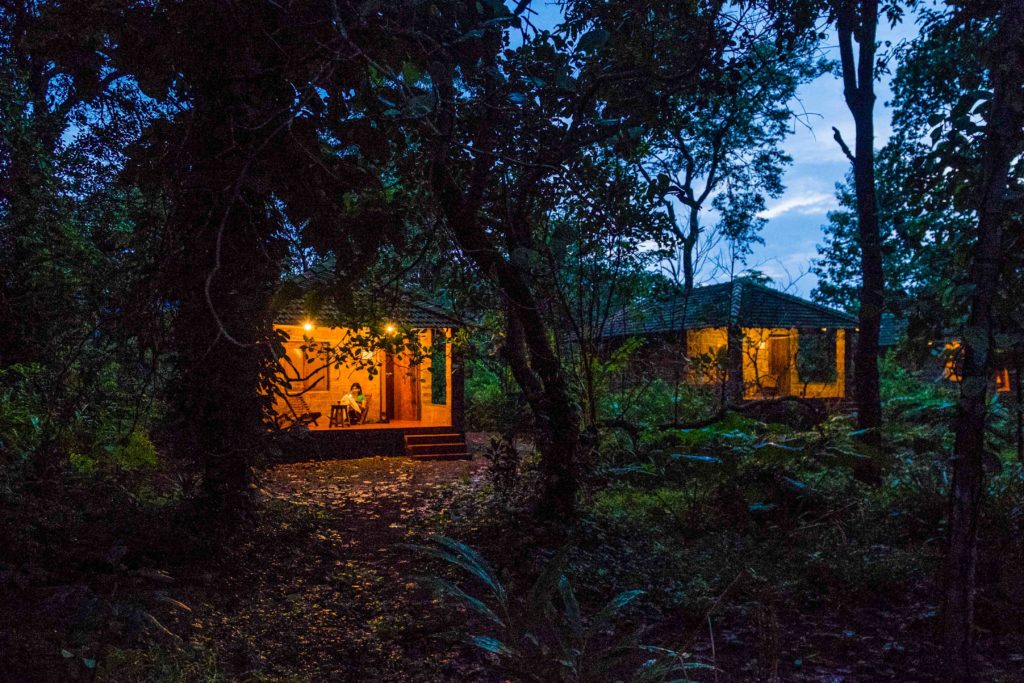
The ideal retreat to bask in nature’s majesty and, perhaps, resuscitate one’s dying reading habit. Photo source: www.dudhsagarplantation.com
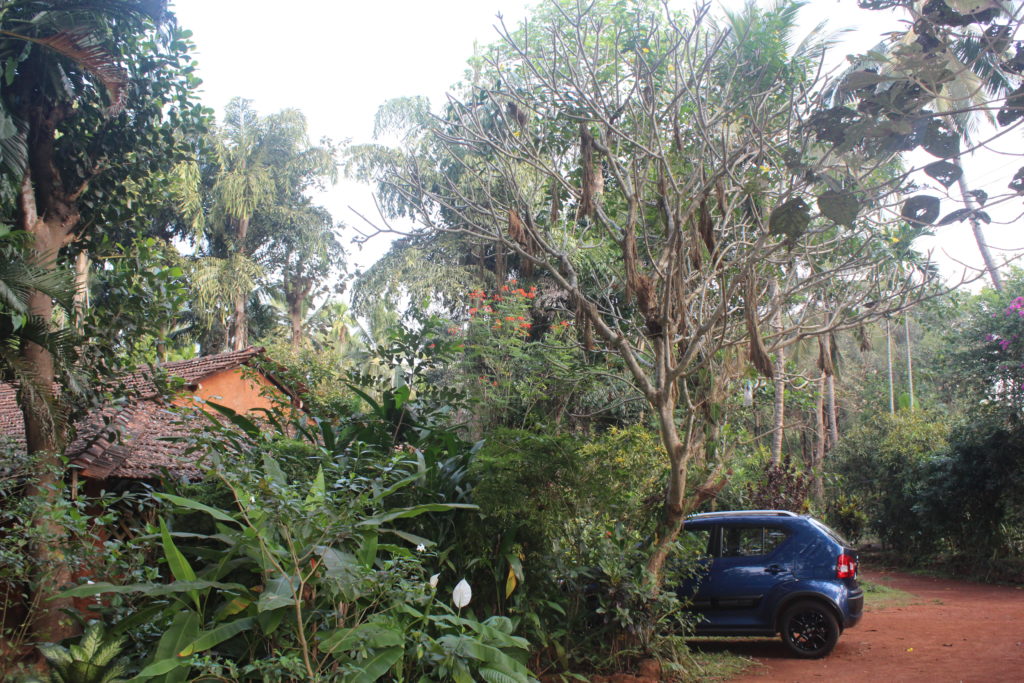
With hundreds of swaying coconut trees, spices, medicinal plants, the rustic cottages and organic swimming pool, the plantation is a nature lover’s dream come true.
The owners—the Malkarnekars—along with their 3 dogs, posse of hens and roosters, 11 mixed breed cows, and pet goat, also reside in this idyllic mini forest in Karmane village (between Sanvordem and Kulem).
With hundreds of swaying coconut trees, spices, medicinal plants, the rustic cottages and an organic swimming pool, Dudhsagar Plantation is a nature lover’s dream come true. It’s the perfect retreat to bask in nature’s majesty, recharge one’s batteries, relish organic food, and resuscitate one’s dying reading habit.
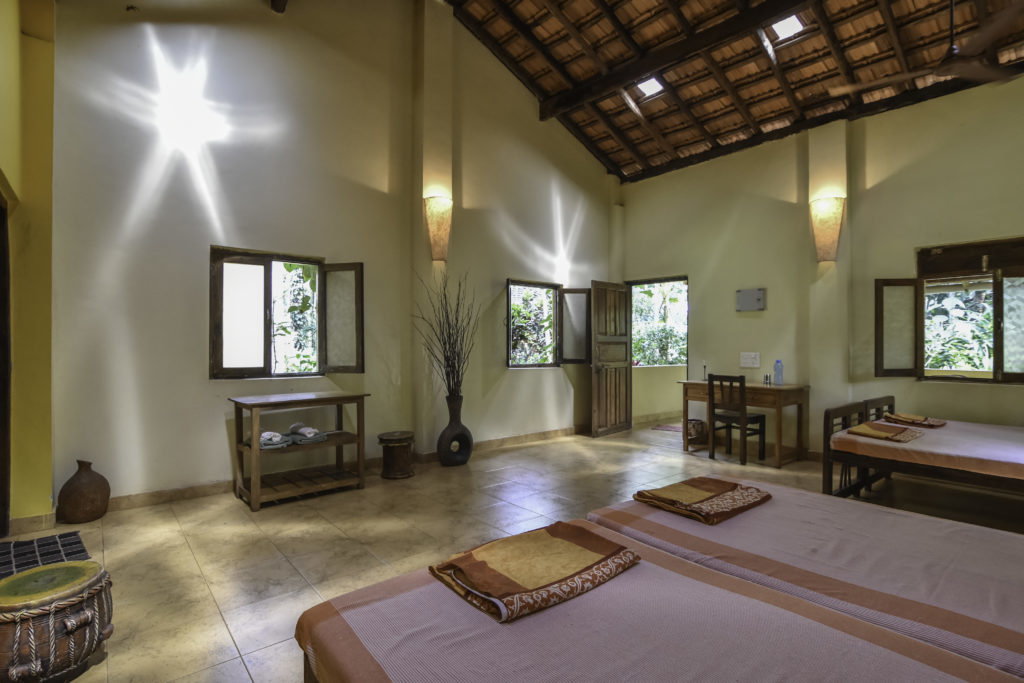
The cottages are made from laterite stone, a red-hued porous rock widely found in Goa. The pores in the rock allow it to retain moisture, keeping the rooms cool naturally. Photo source: www.dudhsagarplantation.com
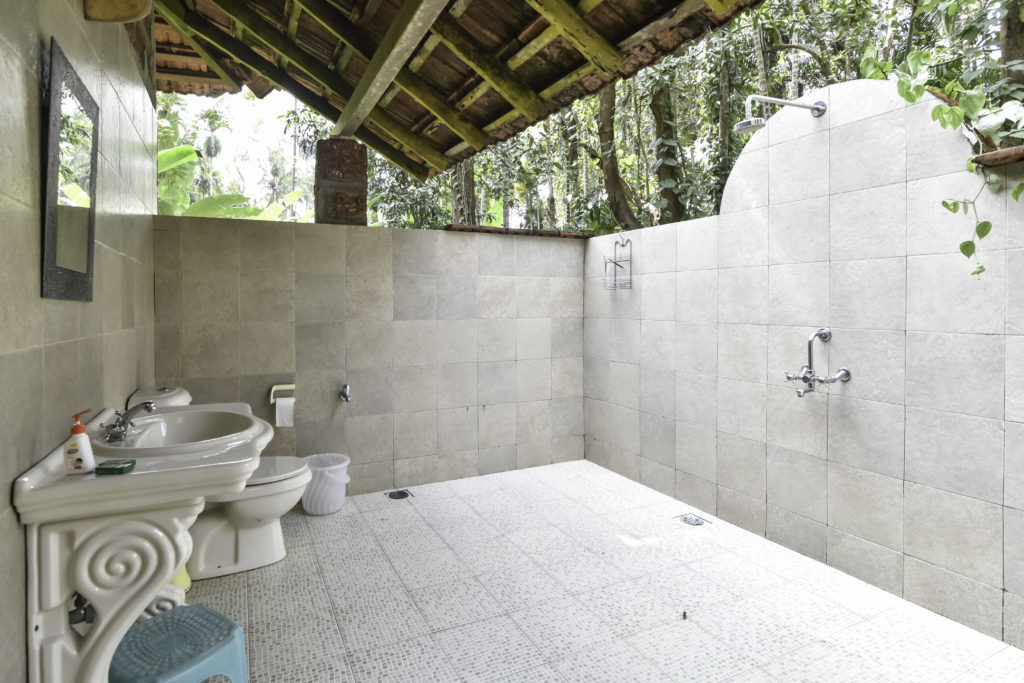
Back in the elements, where we belong. Photo source: www.dudhsagarplantation.com
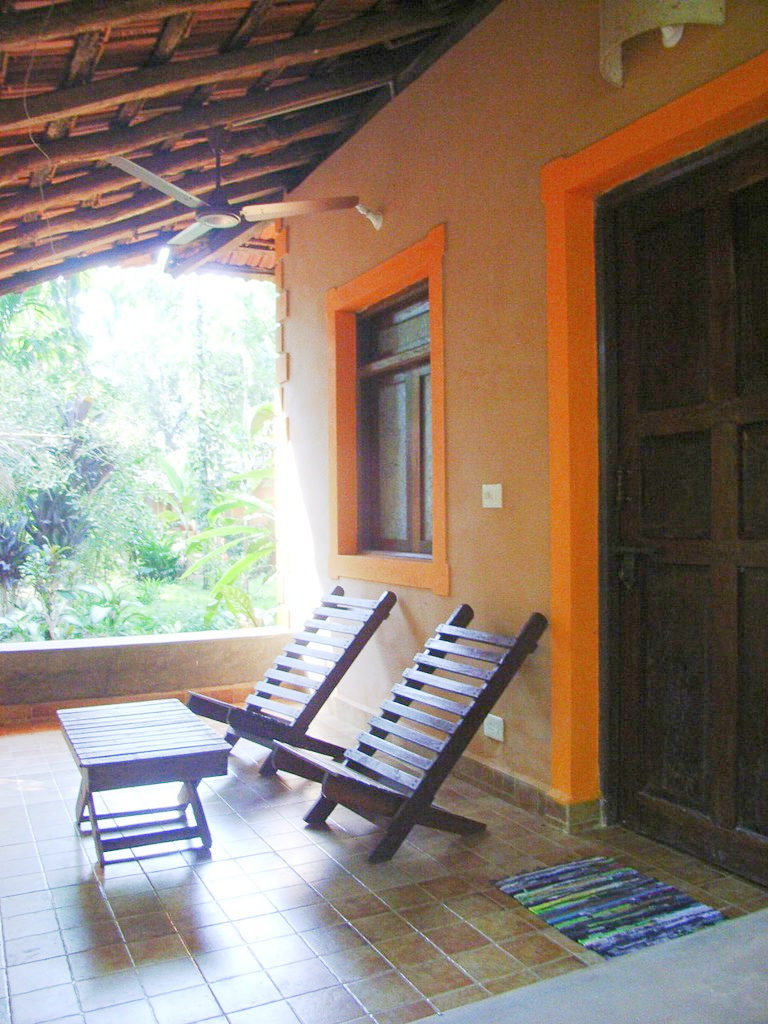
Each cottage has a porch sitout, where one can sit back and witness nature’s alchemy. Photo source: www.malkarnekar.de
HISTORY OF DUDHSAGAR PLANTATION
But the hundreds of trees, plants, the pool, the cottages, etc, did not appear overnight. It has been a laborious task more than 30 years in the making.
In 1984, Ajit Malkarnekar, who was keenly interested in rural living, along with his brother, purchased a 50-acre piece of barren land, with the conviction that it could be transformed into a self-sufficient farm residence.
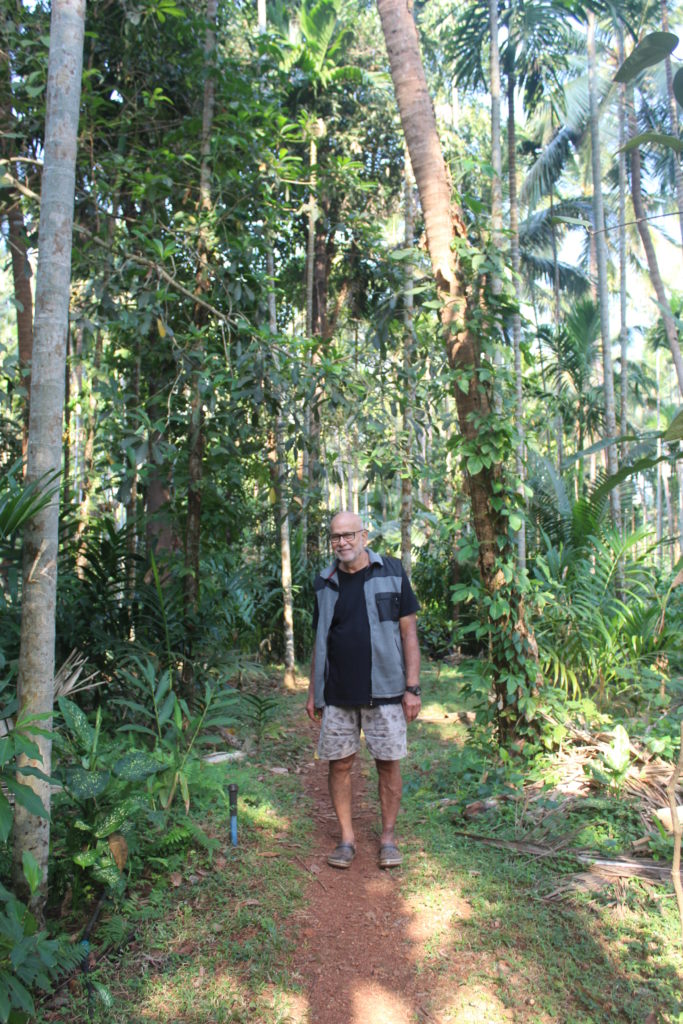
Ajit Malkarnekar (shown above) purchased the farm—at the time, entirely barren—in 1984. In 1985, along with his wife, Doris, he started developing it and christened it ‘Dudhsagar Plantation’.
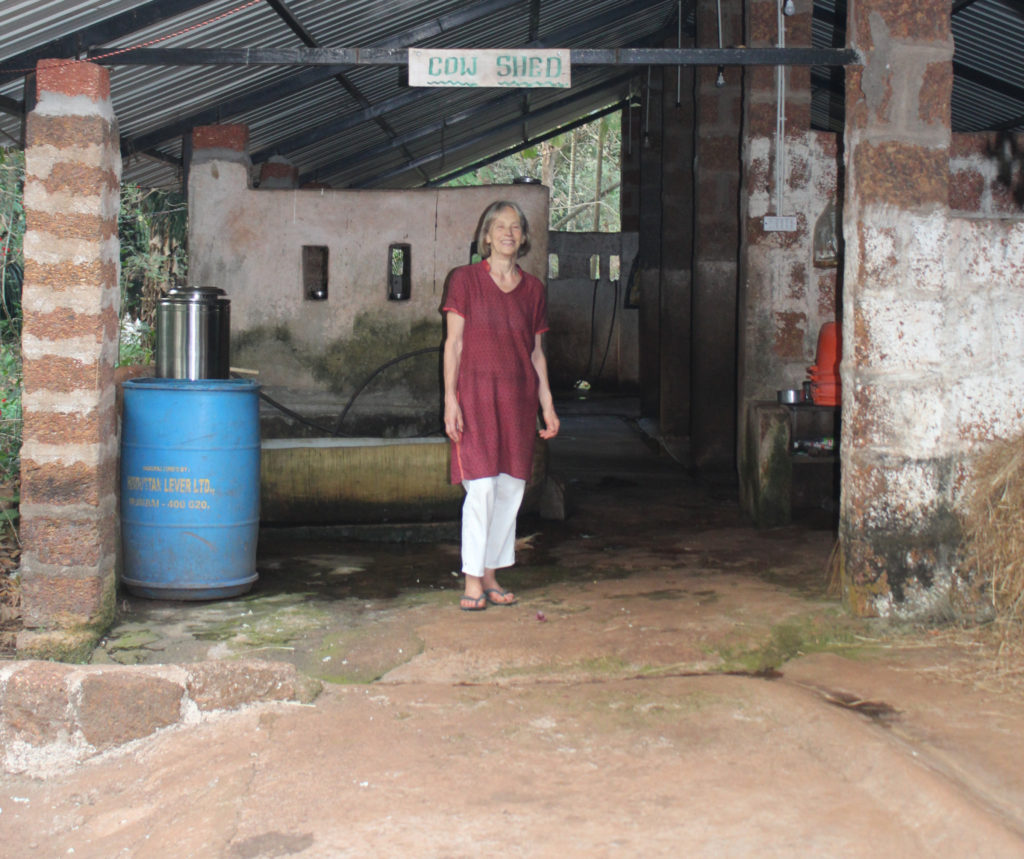
Doris Malkarnekar, at the cowshed on the property.
In 1985, along with his German wife, Doris, he started developing the farm and christened it Dudhsagar Plantation.
Prior to this, Ajit had worked at Anandwan, the village created by Baba Amte for lepers in Chandrapur, Maharashtra. Anandwan also started out as a barren land that was developed into a rehabitational village for lepers, complete with small scale industries to keep the community sustainable. This is also where Ajit met Doris.
Back in the day, Ajit recalls, there was no electricity or water connection at the farm and it was no easy feat to acquire these. The farm is, even today, practically in the middle of nowhere—part of its bucolic charm. However, back in the 80s, transport was uncommon in India and the Malkarnekars had to trek kilometres to and fro the electricity board office in pursuit of an electricity connection.
“There was absolutely no public transport available in these parts at the time and we did not have a vehicle—we had ordered one but even a Fiat took 1 year to arrive post order in those days. So, the multiple pilgrimages to the water and electricity board offices were made on foot,” recounts Ajit.
Eventually, water and electricity arrived at the farm and the planting of trees and plants began. The cottages were added much later, in 2012.
For a while, the Malkarnekar family—Doris, Ajit and their 3 children—lived an idyllic existence on the farm, but as the children started to grow, the need for a school became pressing. The nearest school was miles away and could only be reached by train, forcing the family to pack up and move to Germany for the children’s education. During this time, the farm was left in the care of Ajit’s sister.
Once the children had flown the nest, Ajit returned to the farm full time and constructed the cottages for the farmstay in 2012.
Today, of course, the plantation is fully developed, with every aspect of farm life having been addressed sustainably. Only 25 acres has been cultivated by the hosts, whereas the remaining land has been left to the whims of nature, and is virtually a wild forest.
Ajit’s eldest son, Ashok, is now the farm manager and both father and son reside onsite currently. Doris divides her time between Germany (where she’s still employed as a teacher) and India.
COTTAGE ACCOMMODATION
The cottages are made from laterite stone, a red-hued porous rock widely found in Goa. The pores in the rock allow it to retain moisture, keeping the rooms cool naturally.
The cottages have the typical sloped clay roofs that are ubiquitous in Goan homes, but they don’t seal off the walls and are somewhat elevated in such a manner that allows air in for ventilation. The roof has skylights to let natural light in.
We stayed in a cottage that has a half open bathroom plan, ie, the shower and WC are roofless but with a high-ish boundary wall for privacy. Next to our shower was a pumpkin suspended from a vine. That’s something you will not see in urban life.
For those who don’t favour open bathrooms, they do have cottages with closed off bathrooms as well.
Each cottage has a porch sitout, where one can relax and witness nature’s alchemy. The rooms and bathrooms are large and airy and the cottages are squeaky clean.
FOOD
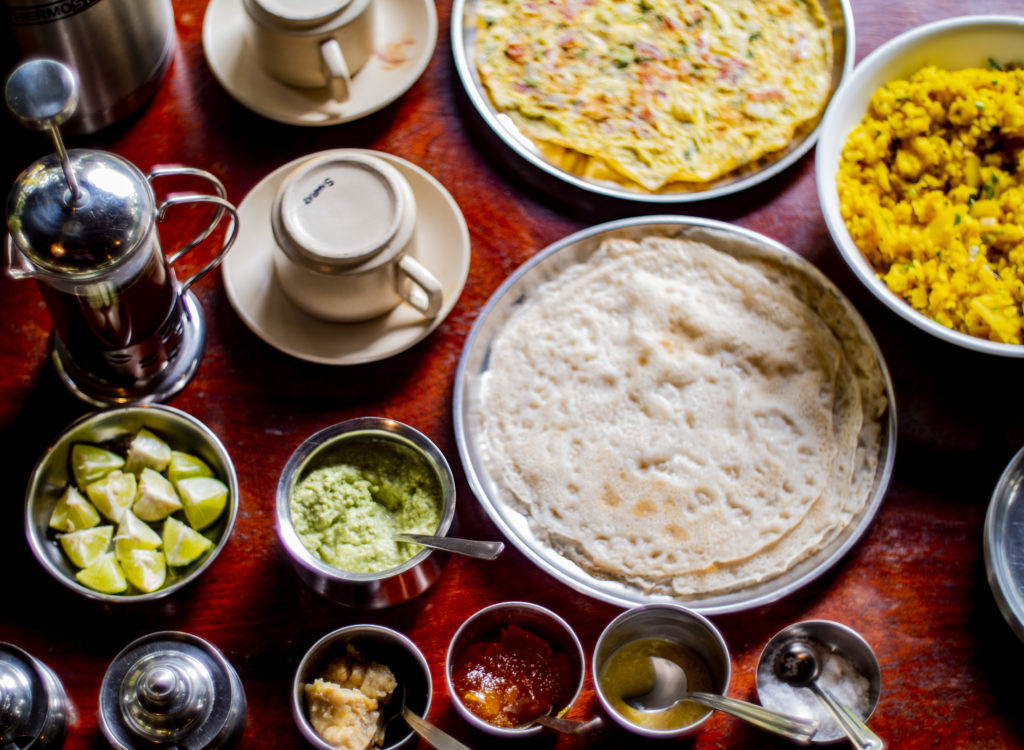
The food at Dudhsagar is organic, delicious, vegetarian and much like home food, but with Konkani flavours. Photo source: www.dudhsagarplantation.com
The entire farm is organic, ie, the Malkarnekars have never used chemical fertilisers or pesticides on its soil or plants. They use neem as a natural pest repellent and abstain from any chemical usage. They promote a totally organic lifestyle, and this extends to their food as well.
The food at Dudhsagar is delicious, vegetarian and much like home food, but with Konkani flavours. It is low on spices, perhaps to accommodate the Western palate, but it works.
Dosa, rice, coconut-infused Konkani dals, an array of vegetables, pickles, Goan bread and much more, make up meals at the farm. For dessert we had vermicelli and milk pudding (sevaiyya), which was light and tasty.
In the dining area is a small bar, where one can order cocktails and juices. I’d recommend their Jungle Juice, a deceptively potent but delicious concoction of their inhouse feni, mixed with lime, water and rock salt.
SPICE TOUR
The hosts provide an hour-long guided tour of the spice plantation, which this author highly recommends. During the walk you can expect to see, smell and taste the plants you well know and some that you may have never heard of. I was thrilled to have tasted my first mango ginger (a variety of ginger that tastes like a mix of ginger and an ambi) and the leaf of an insulin plant (Costus igneus), which lowers blood sugar levels.
With fascination, I crushed the crimson seeds of the Bixa orellana or lipstick tree, which emit red colour, and are used in makeup formulation.
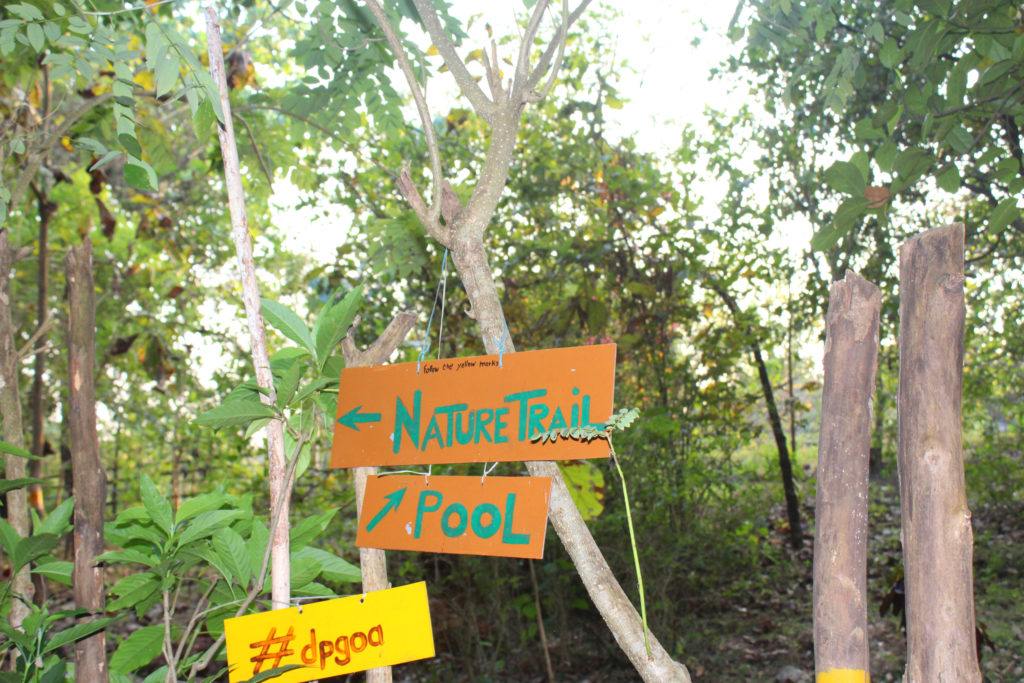
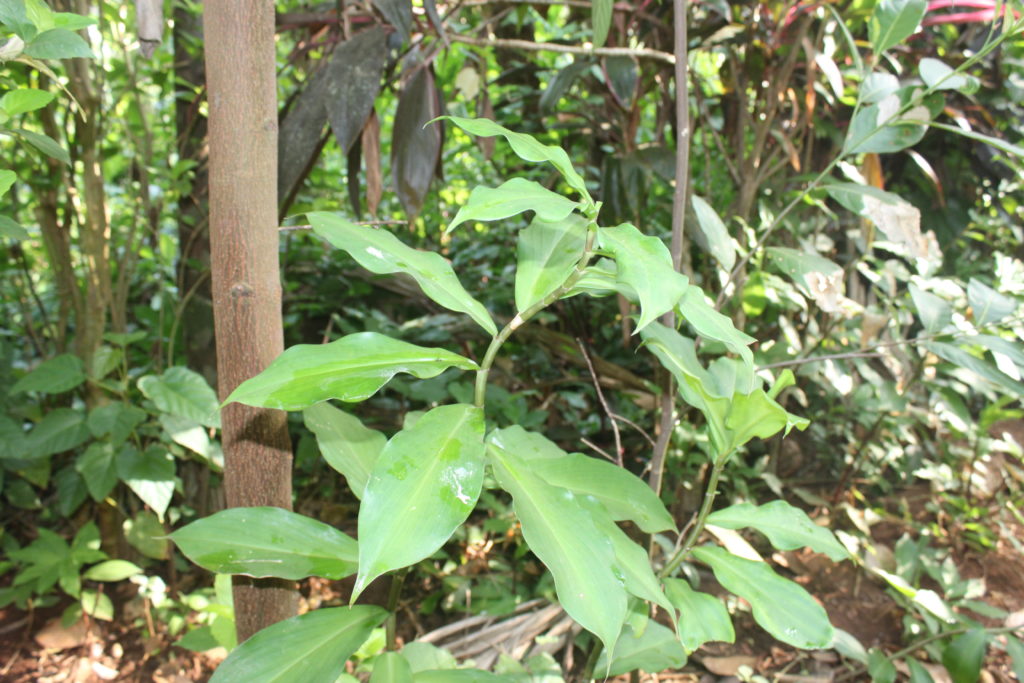
The Insulin Plant (Costus igneus), which lowers blood sugar levels.
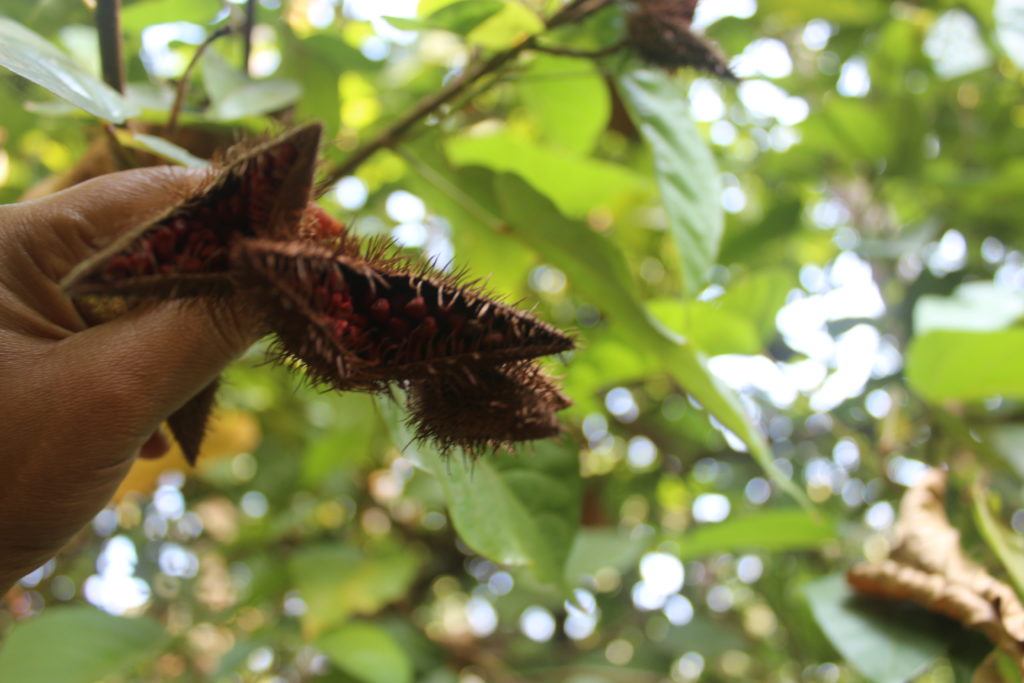
The crimson seeds of the Bixa orellana or Lipstick Tree emit red colour, and are used in makeup formulation.
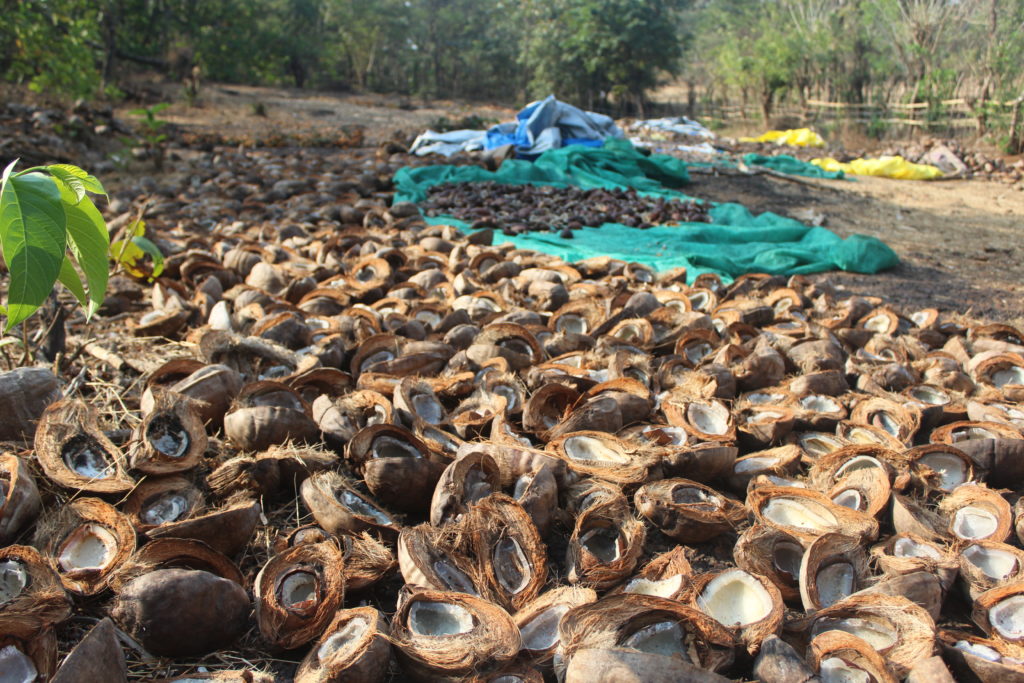
The farm sells organic coconut and cold pressed coconut oil. This image shows coconuts being dried out for oil extraction.
All kinds of spices, vegetables and fruits are grown here—nutmeg, brinjal, pepper, betel nut, cardamom, mace, gooseberry, green chillies, peri peri chillies, turmeric, pea eggplant, lemongrass, allspice, areca, vanilla orchids, black peppercorn and cinnamon, amongst others.
Fruit trees like banana, pineapple, sapota, mango, papaya, butter fruit, guava, jackfruit, passion fruit, star fruit, and bimbli, also abound. And of course, Goa’s famous cashew trees.
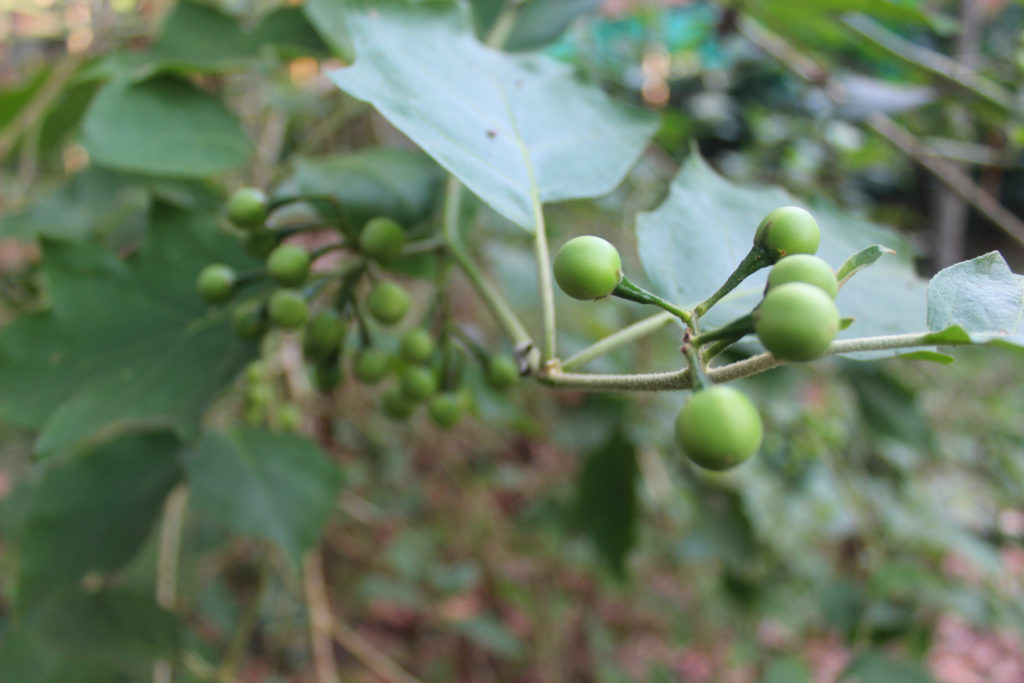
Organic Pea Eggplant.
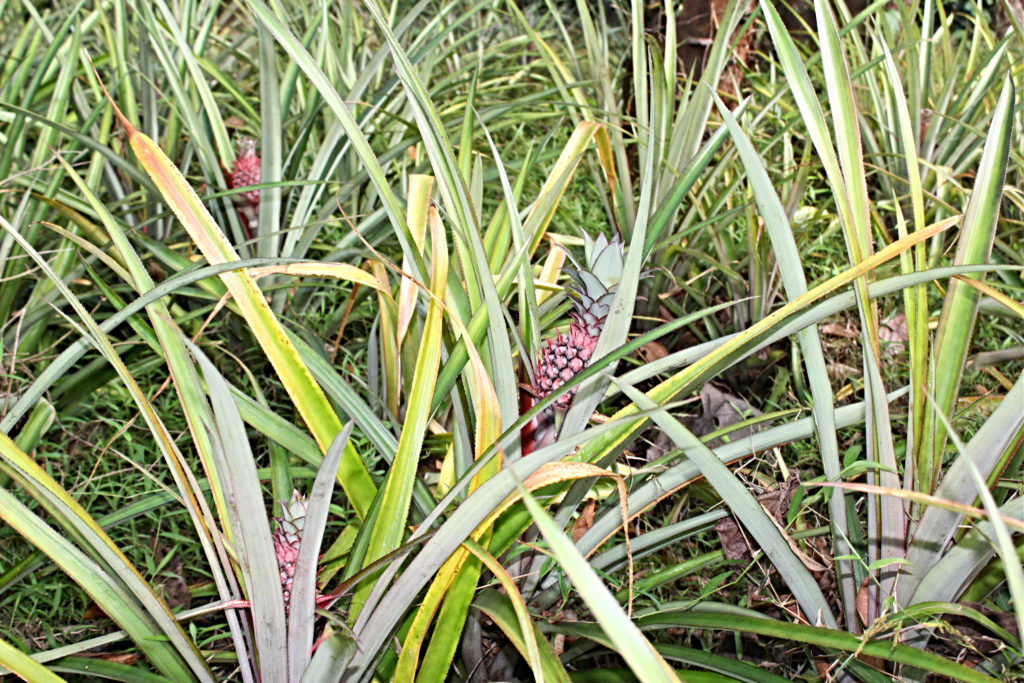
Organic pineapple cultivation.
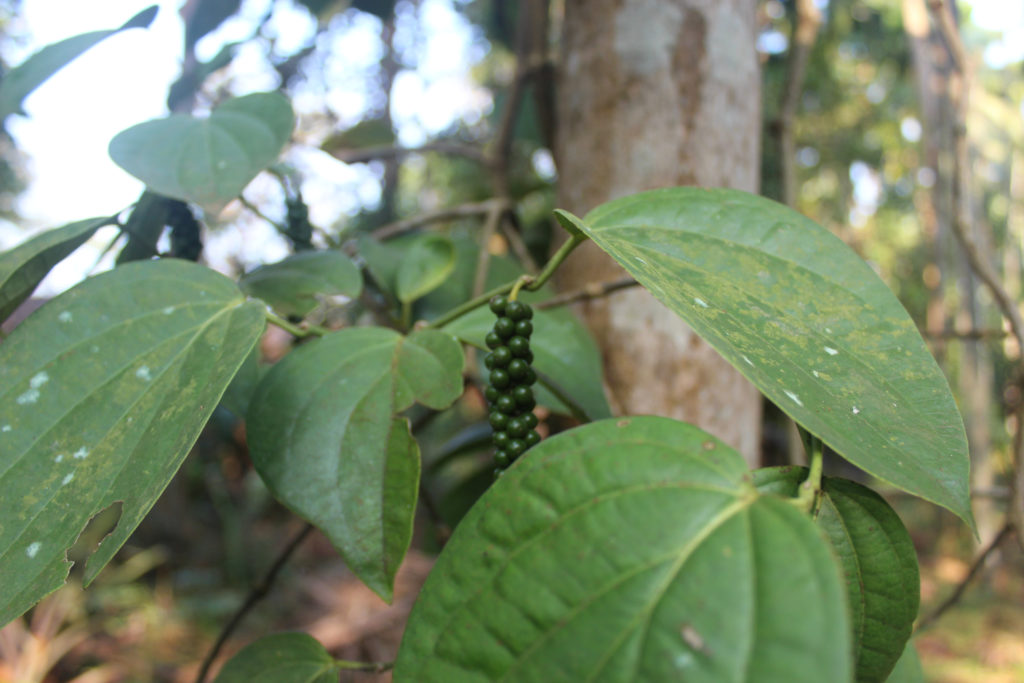
Organic pepper, another product sold at the farm shop.
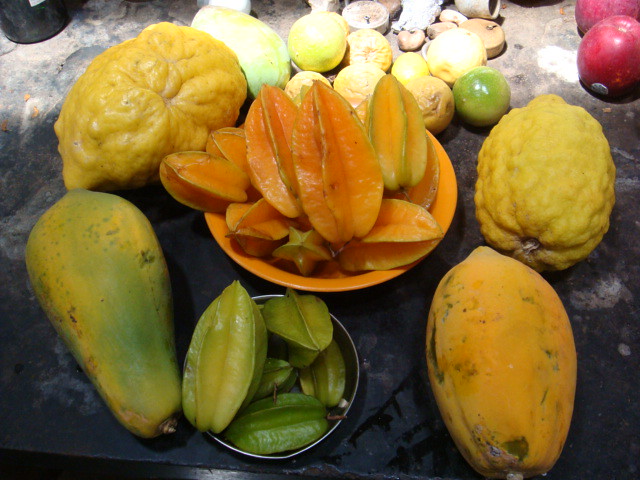
Organic fruits from the farm. Photo source: www.malkarnekar.de
FARM-BREWED ORGANIC FENI & ORGANIC URAAK
Ajit showed me their inhouse distillery in which they brew their own organic feni and uraak. These are Goan spirits derived from the cashew plant. Once a year, the fruit part of the cashews are collected and crushed.
The juice is collected and steam is passed through a furnace in a regulated manner. After a few days of fermentation, feni is obtained. While feni is the second draft of the wine, its first draft—which is lighter on alcohol content—is uraak. While feni has an alcohol content of 55%, uraak has only 40%.
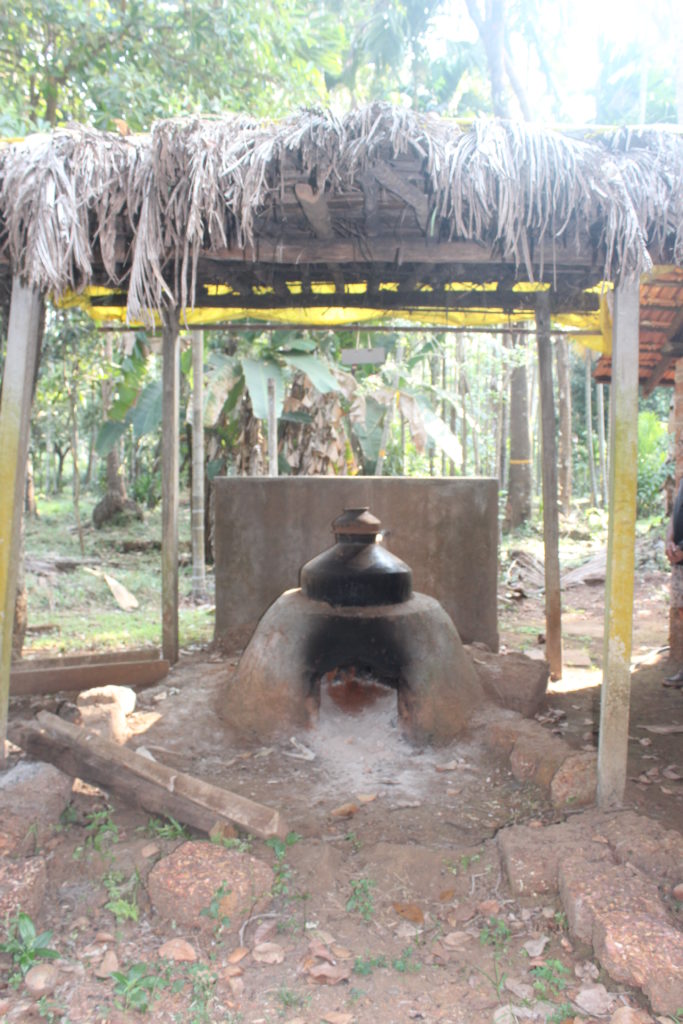
The inhouse distillery in which organic feni and uraak are brewed.
ORGANIC POOL
The highlight, for me, was the organic swimming pool, which is 100% chlorine-free. The owners have ingeniously planted water purifying plants on the left corner of the pool to ensure clean water. Roughly 6 ft in depth, the pool is large enough to cover a decent number of laps and is a delight to swim in.
FARM SHOP
Organic products are on offer for those who wish to take a piece of Dudhsagar Plantation back with them. The farm shop sells coconut, coconut oil, pepper, and banana dried fruit—all of it organic. I did not buy the rest but did take some of their banana dried fruit, which is lip-smackingly delectable. I highly recommend purchasing at least a couple of packets of this delicious and healthy treat.
FARM ANIMALS
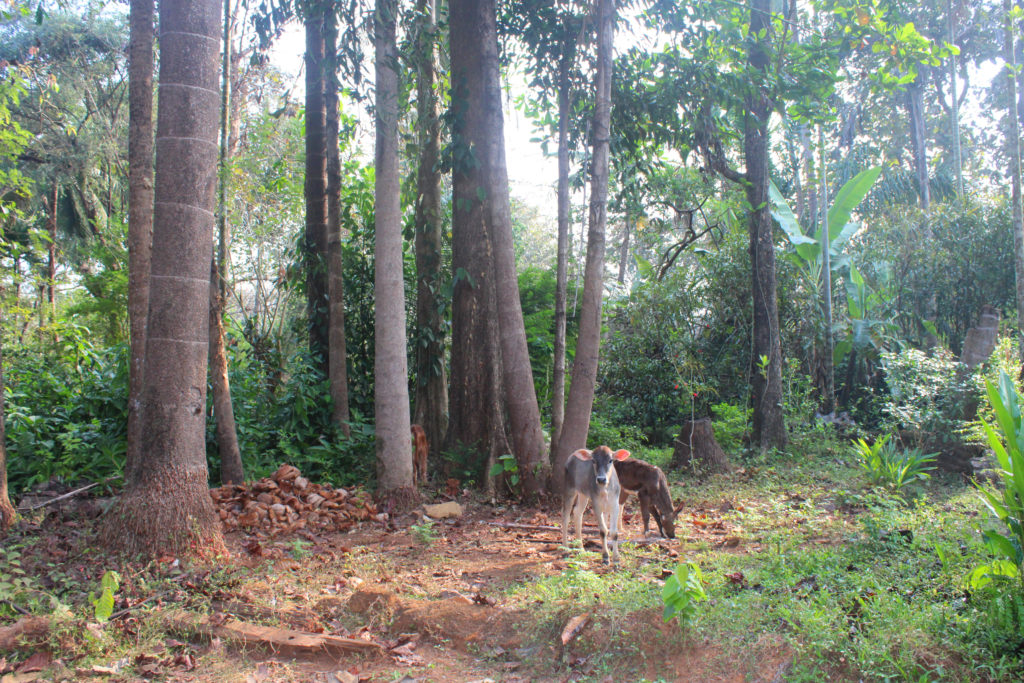
3 dogs, a posse of hens and roosters, 11 mixed breed cows, and a pet goat, also reside in this idyllic mini forest.
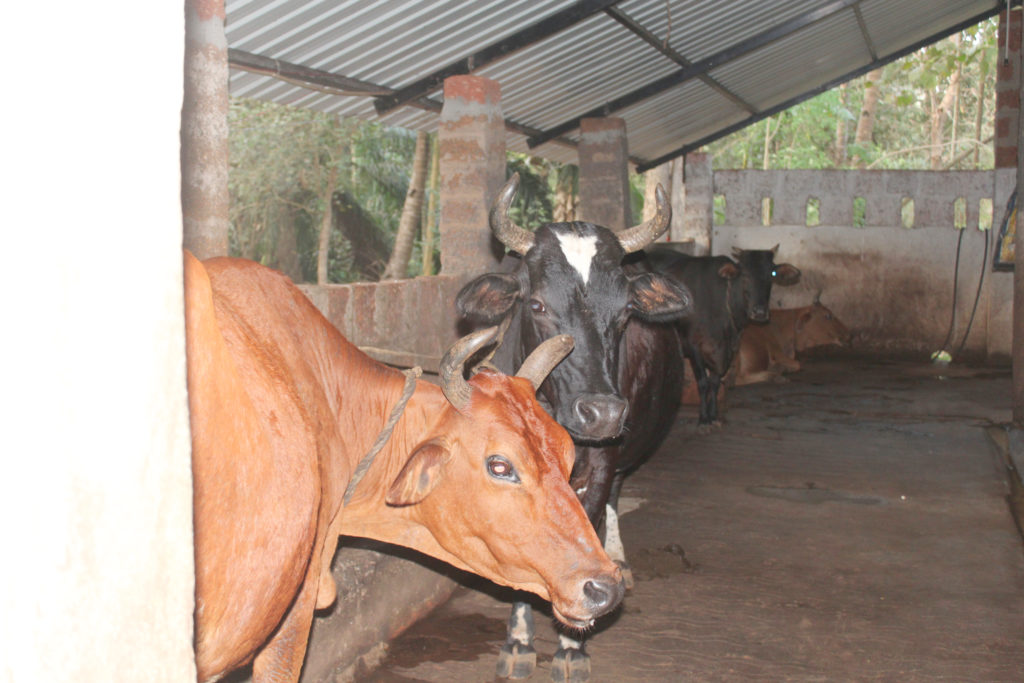
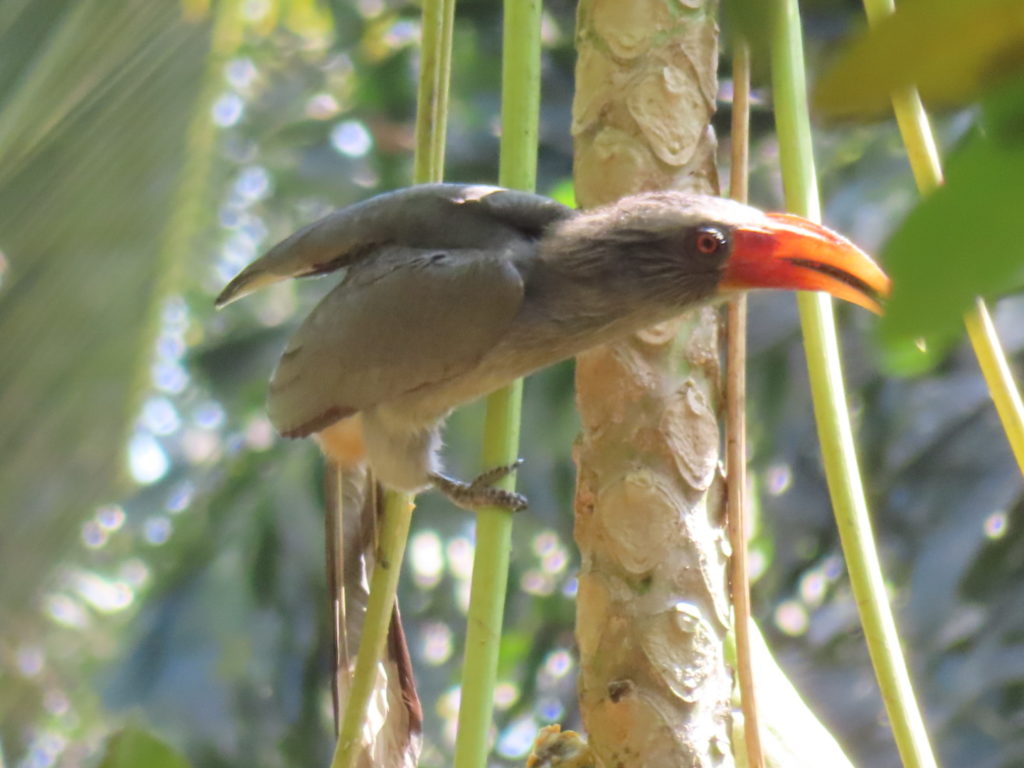
The property boasts rich biodiversity, with farm animals, birds, bees and butterflies. And yes, insects, frogs and lizards, too. Photo source: www.dudhsagarplantation.com
The property boasts rich biodiversity, with farm animals, birds, bees and butterflies. And yes, insects, frogs and lizards, too.
The robust hens and roosters can often be found prancing about in friendly wrestling matches with each other and crowing to their hearts’ content. The dogs alternate between shadowing their master and lounging about on durries in the dining area.
Doris informs me the milk from the cows is used on the farm, with the bulk of it being sold to a local cooperative. The hens and roosters live on the farm as pets and are only providers of eggs, not a source for meat. The goat was rescued and is a pet on the farm as well.
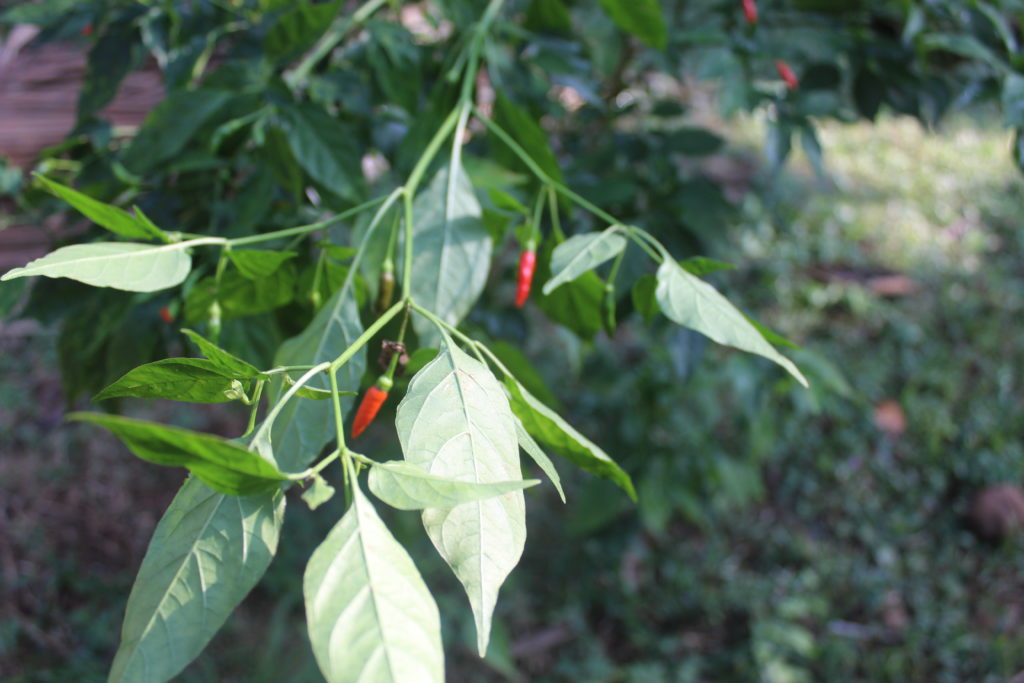
Organic chillies.
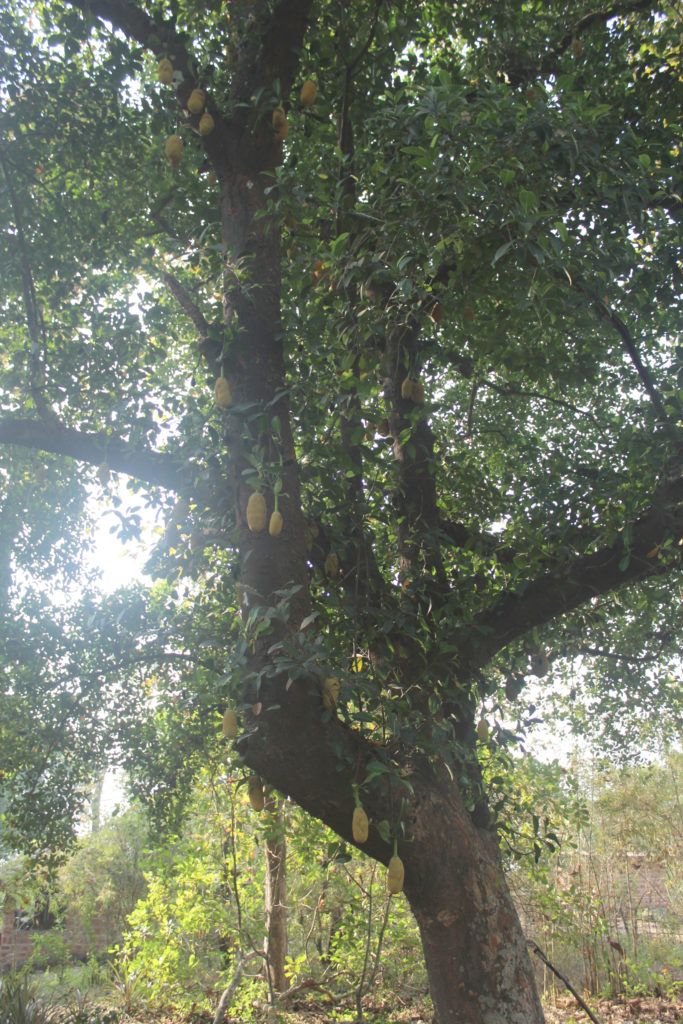
Organic jackfruit tree.
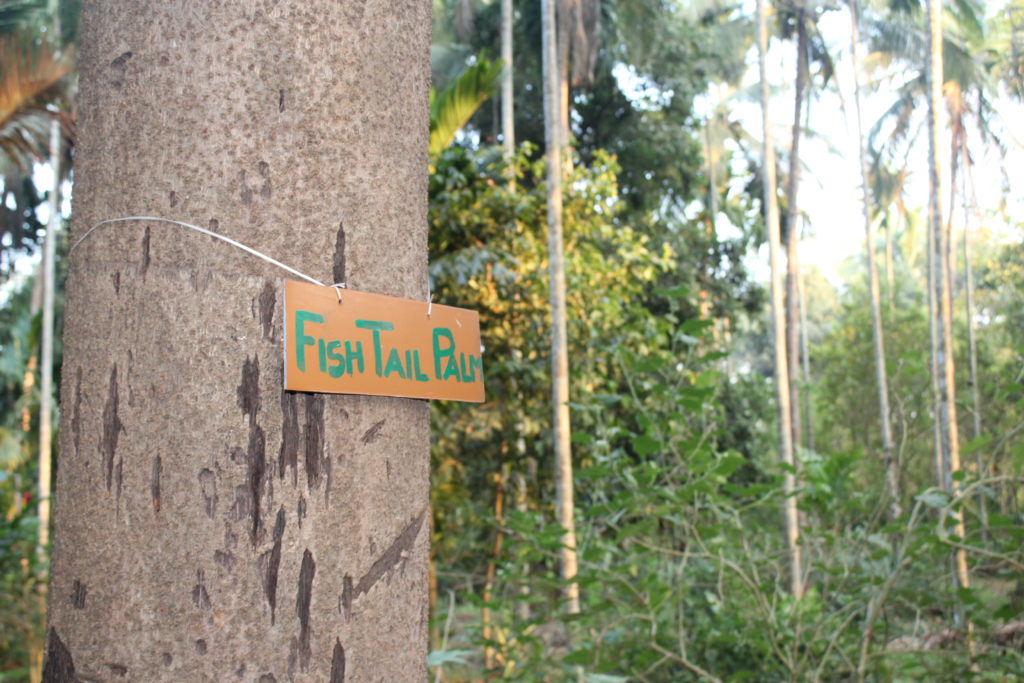
Fish Tail Palm tree.
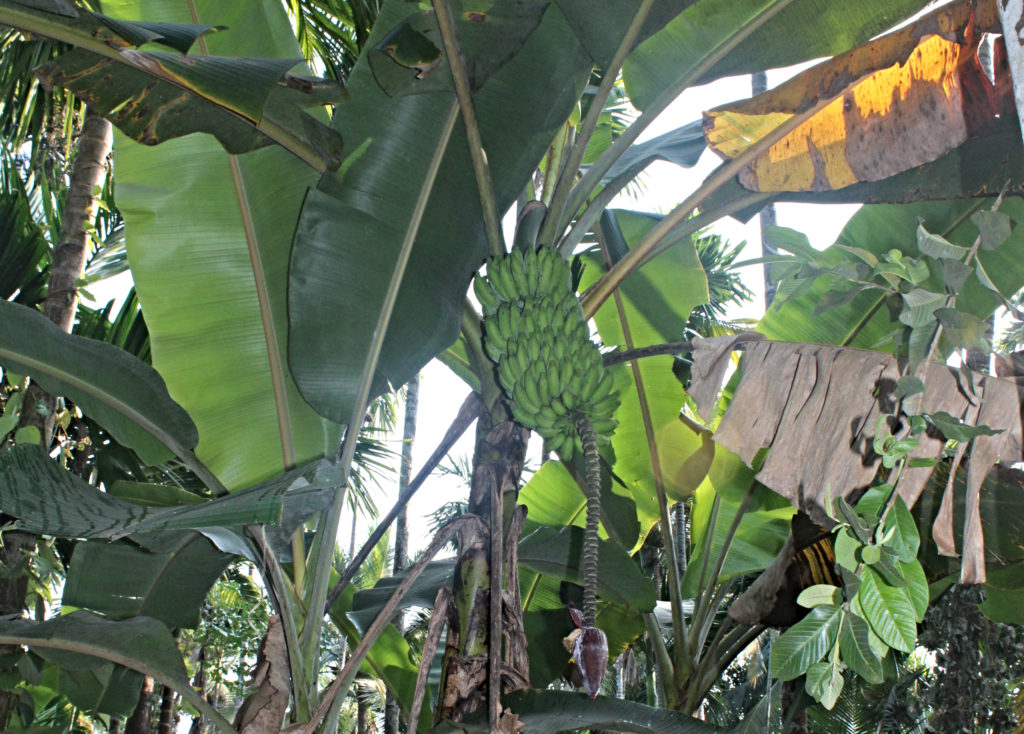
Organic banana cultivation at the farm.
SUSTAINABLE LIVING AT THE FARM
The farmstay practises sustainability by rainwater harvesting, converting cow dung to biogas (gobar gas) and nurturing the flora and fauna. The slurry from the biogas plant is used as fertiliser for the plants. The farm has 3 wells—one for drinking water and the other two for irrigation.
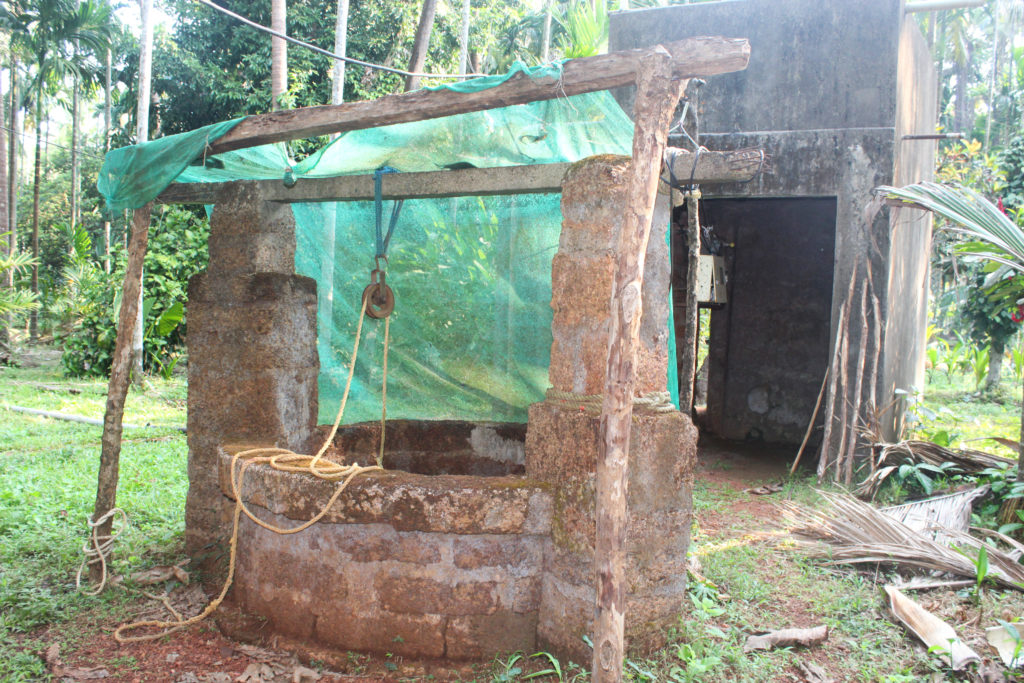
The farm has 3 wells—one for drinking water and the other two for irrigation.
FARM-LIFE CHALLENGES
While the farm is well established now and has evidently bid adieu to the hurdles of the past, according to Doris, they still face challenges—primarily that of labour or the lack thereof.
Since inception, the Malkarnekars have engaged local Goans to help out in the farm. But today, the new generation of Goans consider it beneath them to work on a farm. “Many young Goans are manning self-owned tea stalls or the like and don’t mind sitting idle all day in wait of merely a patron or two. Still, they decline our offer to work on the farm, which would keep them gainfully employed,” laments Doris.
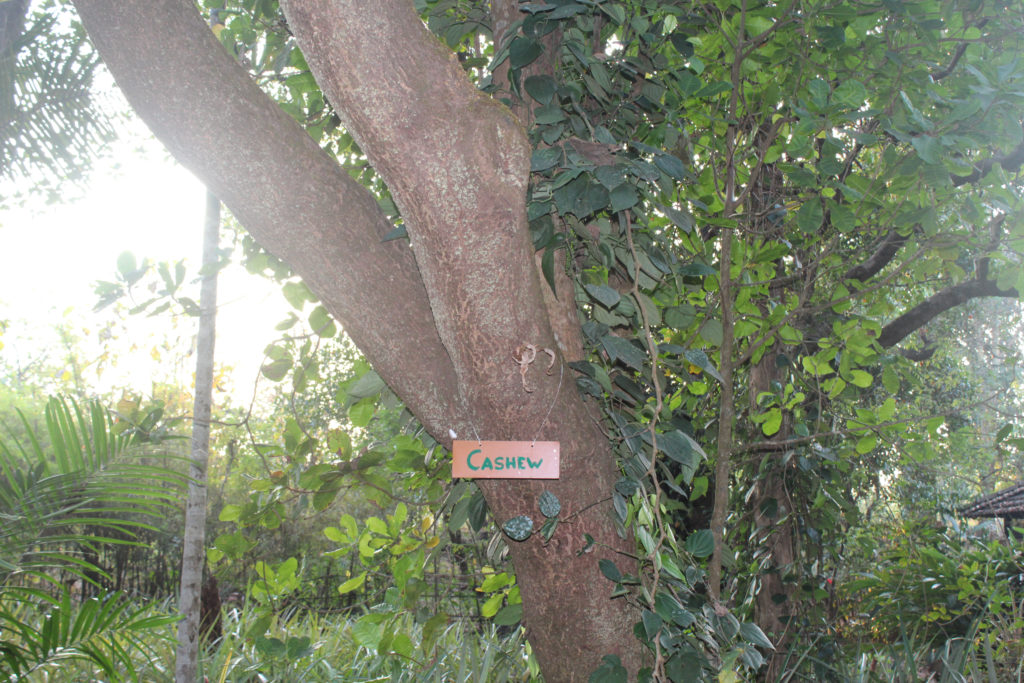
A cashew tree.
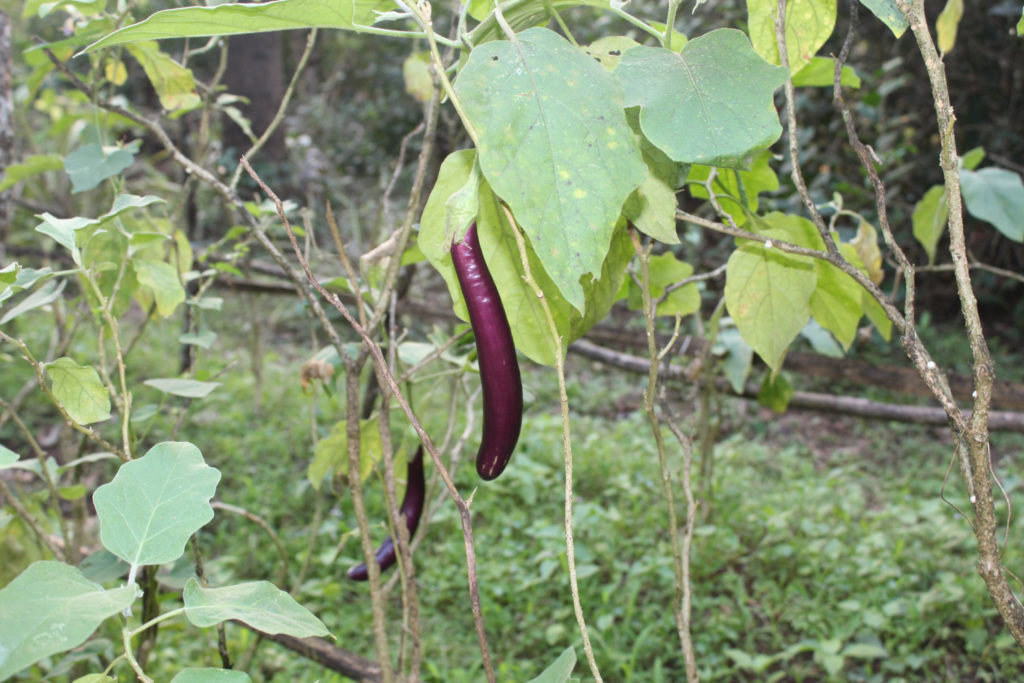
Organic brinjal.
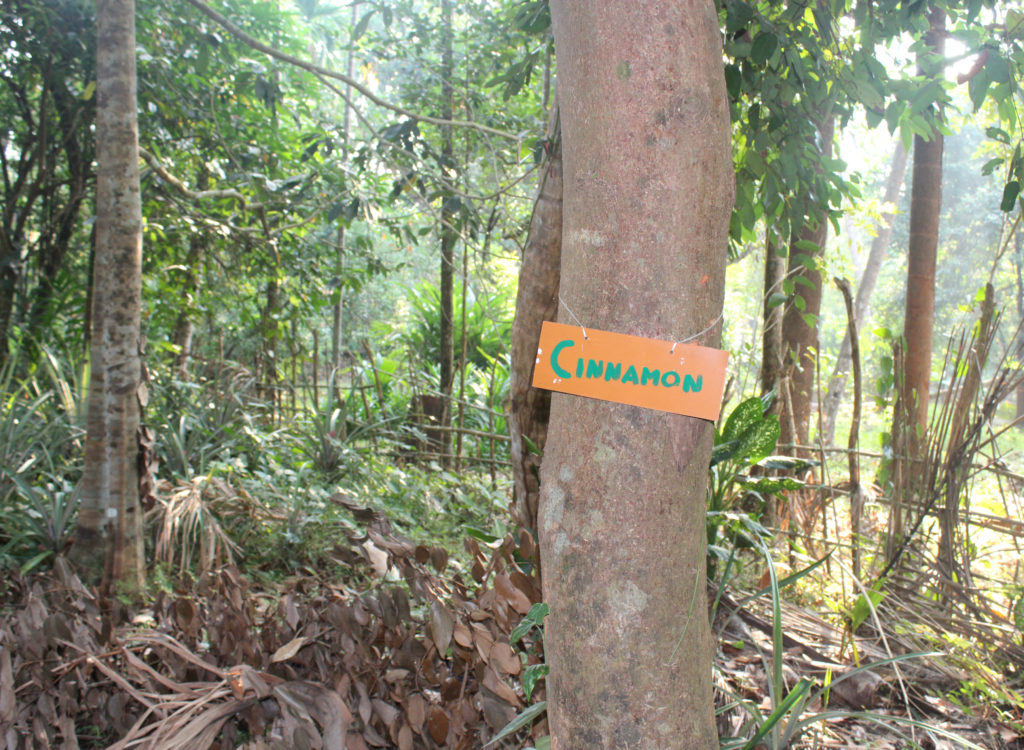
A cinnamon tree.
Therefore, the Malkarnekars now import labour from Jharkhand, but Doris fears this is only a stopgap solution as the labourers will eventually want to return to their native land.
WARM ATMOSPHERE
The Malkarnekars are soft spoken, welcoming hosts, always up for a chat. At the dining area, guests, and the hosts themselves, partake of each meal, including morning and evening tea. This allows for many interesting conversations to flow.
The relaxed, friendly conversations amongst strangers evoke a sense of intimacy, making Dudhsagar feel more like a friend’s farmhouse than paid accommodation.
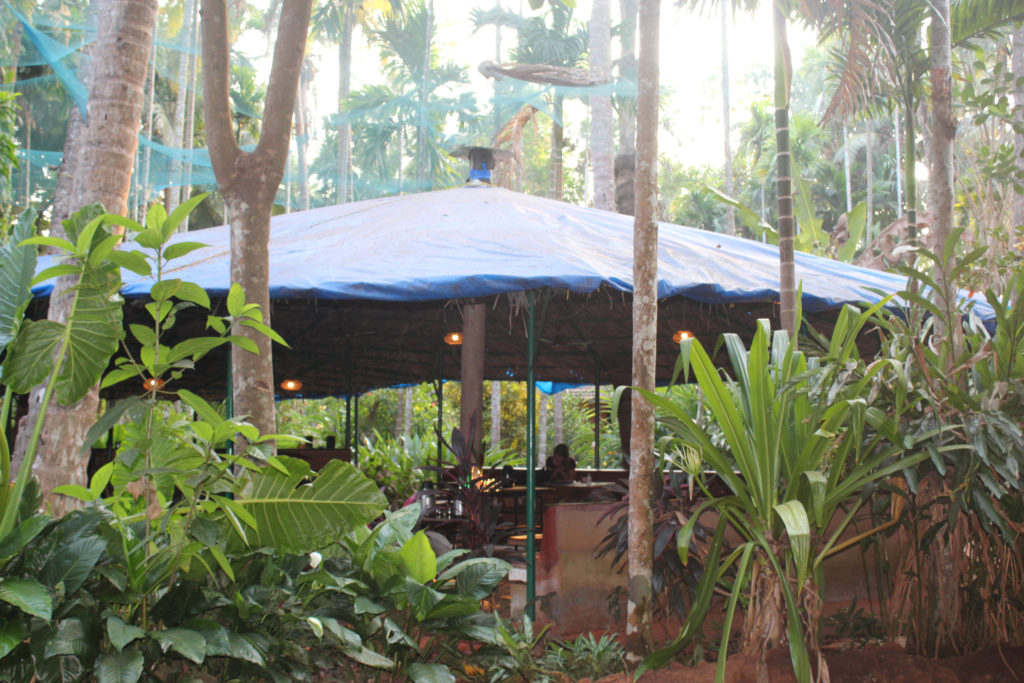
The central dining area, where guests, as well as, the hosts, partake of each meal, including morning and evening tea.
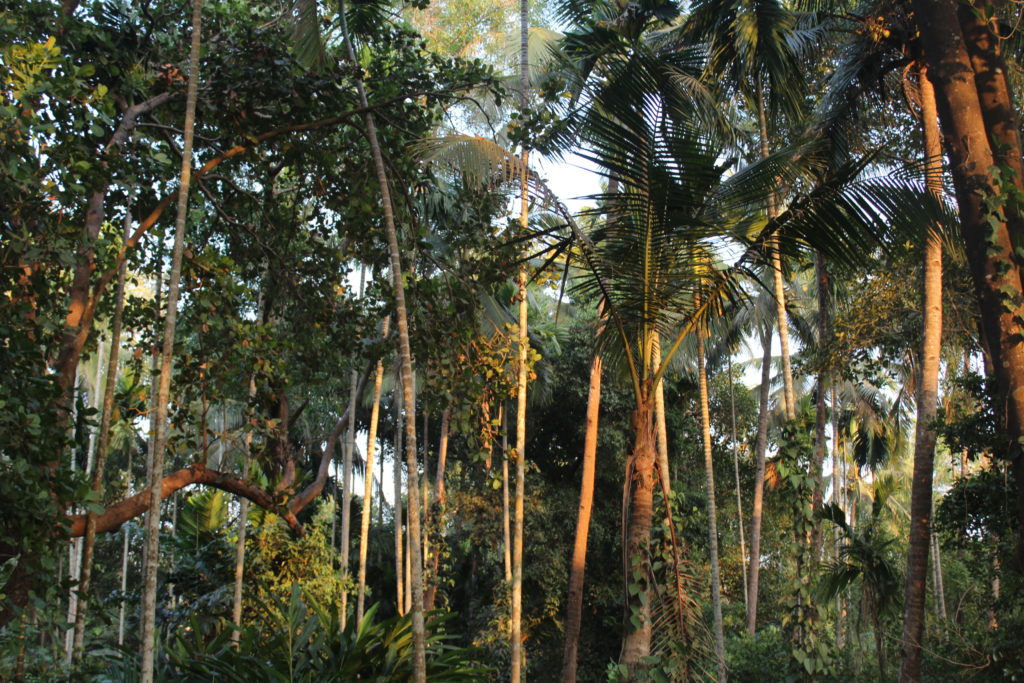
You will not find cellphone reception here, nor room service. What you will find is lots and lots of tranquility, greenery, smiles and organic food.
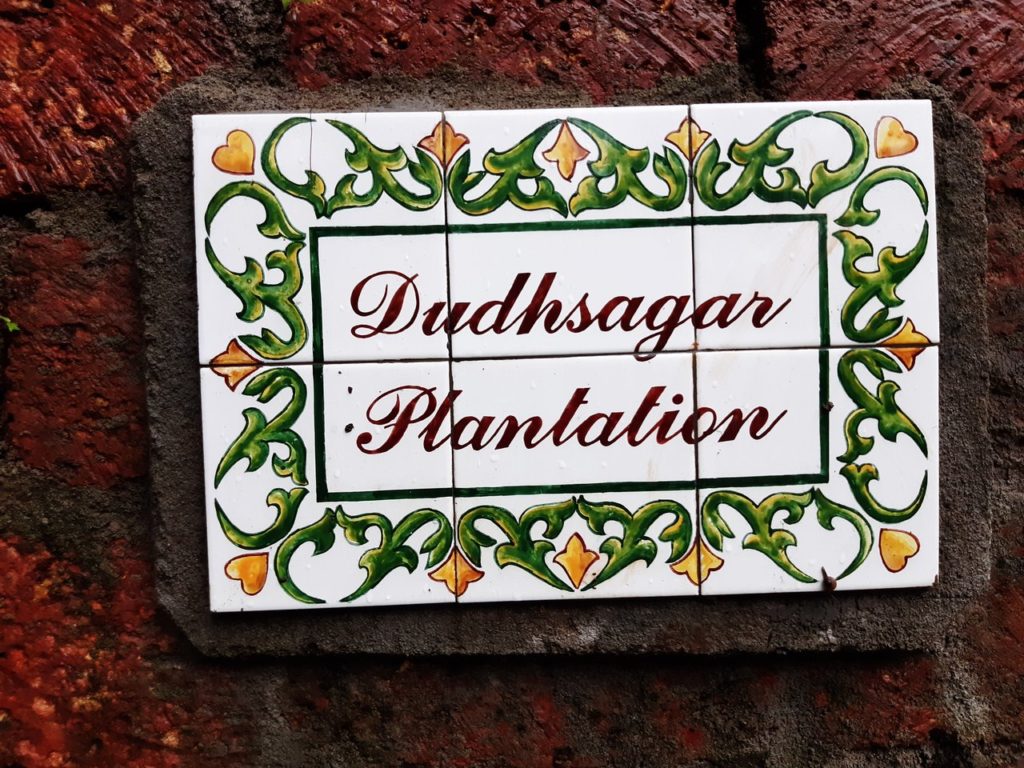
Photo source: Anuradha Dorlikar/Tripadvisor
A cottage peering through the foliage, the embrace of greenery, the fragrance of aromatic plants, the sound of breeze rustling through tree leaves, the mooing of cows and crowing of roosters, sunrays peeking from treetops, laps in the organic pool looking out to green infinity, the understated flavours of Goan cuisine, the ebb and flow of convivial conversations—all, make Dudhsagar Plantation a regenerative balm for the body, mind and soul.
It bears mentioning, this is a family farm, not a five star hotel. You will not find cellphone reception here, nor room service. What you will find is lots and lots of tranquility, greenery, smiles and organic food. And even wifi.
TIP
Nearby attractions include Dudhsagar Falls, the Tambdi Surla Temple and Saveri Waterfall and Usgalimol Rock Carvings. Or one can take an excursion to Chandor to relive the Portuguese era.
I noticed some guests taking a day trip to North Goa (which is 1.5 hours away, one way) and back, but that defeats the purpose of visiting the plantation. While at the farm, this author recommends forgetting all about FOMO and soaking, without agenda, in the bounty of nature. If you must venture out, stick to attractions in the vicinity.
CONTACT DETAILS
DUDHSAGAR PLANTATION
Karmane Village
403410 Goa/India
Tel: +91 9765364456 (Ashok) / +91 9420766782 (Ajit)
Email: [email protected]
Website: www.dudhsagarplantation.com


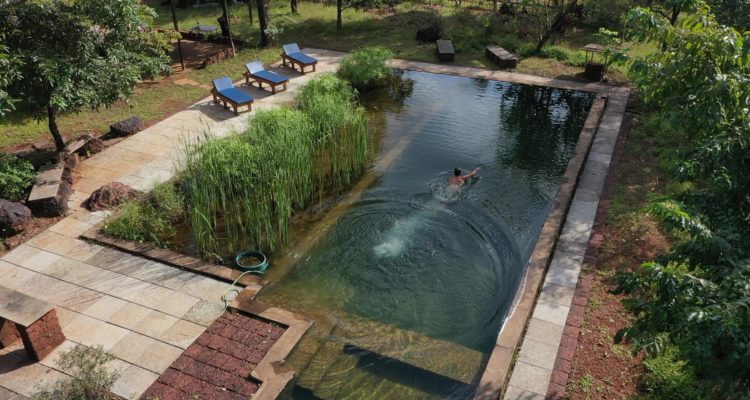
Leave a Reply